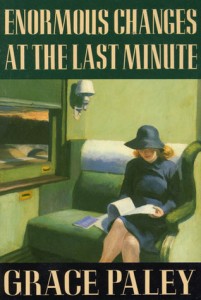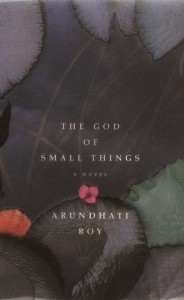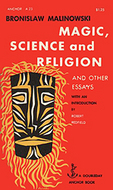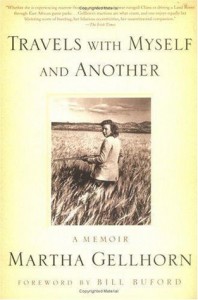
Enormous Changes at the Last Minute
Two of the most powerful sentences Paley wrote in the title story of Enormous Changes at the Last Minute follow one another back to back: “He had had a habit throughout the twenty-seven years of making a narrow remark which, like a plumber’s snake, could work its way through the ear and down the throat, halfway to my heart. He would then disappear, leaving me choking with equipment.”
If Paley had not used the plumber’s snake analogy, the path of words “through the ear and down the throat, halfway to my heart” could be sweet or seductive or slippery, but the image of the plumber’s snake gives at once a wheedling and an invasive implication. I can see a man casually unrolling the long metal snake, maybe he’s smoking a cigarette. The snake goes farther and farther in, working toward her heart against her wishes and scraping the sides of the canal, and if it is one of the snakes with a claw at the end, doing further damage along the way.
If the next image were him reeling it back in, then I would think of all the filth along the length of the snake, but no, he leaves it in, clogging the canal and leaving his job memorably half-finished. Then there is the sexual connotation of the words “snake” and “equipment,” where the narrator is figuratively left full of the unwanted genitalia he unraveled inside her. Paley is showing how he got to the narrator, past her better judgment and then left her “choking” on the fact that he let him get to her again.
Faith in the Afternoon
In “Faith in the Afternoon,” Paley presents another sentence packed with meaning: “Faith really is an American and she was raised up like everyone else to the true assumption of happiness.” The “assumption of happiness” explains the uniquely American viewpoint Faith holds that we are entitled to a good life and that good things happen to good people. But assumption also has the connotation of rising to heaven in living form.
Paley is equating living in America with living in heaven which offers a stark contrast to Faith’s grandparents’ lives in Eastern Europe and the hell of the holocaust from which they fled. In a few simple words, Paley embodies the ideological differences that separate the generations.
Again in “Faith in the Afternoon,” we meet Bugsy. About her dereliction after meeting Ricardo and becoming a whore, Paley writes: “[s]he soon gave up spreading for the usual rewards, which are an evening’s companionship and a weekend of late breakfasts.” Bugsy would simply be a tragic figure if it weren’t for her place in the relationship as the former lover of Faith’s first husband.
Because of what happened to Bugsy, we see the potential ruin of Faith by her relationship with Ricardo. But in Faith’s attitude toward sex, we also see that she is getting paid though not with money and we start to wonder whether Faith escaped from her relationship with Ricardo as unscathed as we would like to think.
I love that Paley can say so much with so few words. The language she uses is always appropriate to the characters, but the words’ rich connotations imply worldliness. I love to use a good image when I can find one, and I hope I can imbue one with as many luscious possibilities as Paley does.
If this review made you want to read the book, pick up a copy of Enormous Changes at the Last Minute from Bookshop.org. Your purchase keeps indie booksellers in business and I receive a commission.
 Of The God of Small Things by Arundhati Roy, John Updike wrote, “A novel of real ambition must invent its own language, and this one does.” This quote alone is neither complimentary nor derogatory, but after reading this gorgeous book, I am awestruck at how Roy’s small tweaks to spelling, capitalization, and compound words captured both my attention and the essence of the characters and setting. The language she invents for this book is only the beginning of her ambition and every word on every page is worth the read.
Of The God of Small Things by Arundhati Roy, John Updike wrote, “A novel of real ambition must invent its own language, and this one does.” This quote alone is neither complimentary nor derogatory, but after reading this gorgeous book, I am awestruck at how Roy’s small tweaks to spelling, capitalization, and compound words captured both my attention and the essence of the characters and setting. The language she invents for this book is only the beginning of her ambition and every word on every page is worth the read. Nearly every review you read about Dora: A Headcase begins with some version of the following phrase, “contemporary coming-of-age story based on Freud’s famous case study.” If I had known this, my reading of the book might have been more nuanced. But I didn’t. I went to the store in search of Yuknavitch’s memoir, The Chronology of Water, which I was unable to find. What they did have were several copies of Dora. I like the serendipity of discovering a book, so I bought and read this one without considering the back cover or the introduction. I may have missed a dimension of the book in doing so, but it didn’t dampen my enjoyment.
Nearly every review you read about Dora: A Headcase begins with some version of the following phrase, “contemporary coming-of-age story based on Freud’s famous case study.” If I had known this, my reading of the book might have been more nuanced. But I didn’t. I went to the store in search of Yuknavitch’s memoir, The Chronology of Water, which I was unable to find. What they did have were several copies of Dora. I like the serendipity of discovering a book, so I bought and read this one without considering the back cover or the introduction. I may have missed a dimension of the book in doing so, but it didn’t dampen my enjoyment. Jamie Ford’s Hotel on the Corner of Bitter and Sweet showcases a very different but equally real Seattle. Set primarily in the International District during World War II, the book tells the story of Chinese-American Henry and Japanese-American Keiko and a love that could not be.
Jamie Ford’s Hotel on the Corner of Bitter and Sweet showcases a very different but equally real Seattle. Set primarily in the International District during World War II, the book tells the story of Chinese-American Henry and Japanese-American Keiko and a love that could not be. A random reference in another book led me to finally pull this tattered paperback from my to-read shelf. I have a cultural bias toward Poles and though I had no real idea what this book was about, I was in.
A random reference in another book led me to finally pull this tattered paperback from my to-read shelf. I have a cultural bias toward Poles and though I had no real idea what this book was about, I was in. Ann Hedreen turned me on to Martha Gellhorn in a
Ann Hedreen turned me on to Martha Gellhorn in a  The highlight of this nonfiction binge was definitely Anderson Cooper’s Dispatches from the Edge. Cooper found a way to marry a straightforward reportage of some pretty horrific war and devastation with a frank look at the trauma of his own life. For the majority of the book, he keeps his own emotion out of the narrative. He paints the scenes in enough detail that the reader can easily interpret and react to the facts on their own. This book hit exactly the right tone.
The highlight of this nonfiction binge was definitely Anderson Cooper’s Dispatches from the Edge. Cooper found a way to marry a straightforward reportage of some pretty horrific war and devastation with a frank look at the trauma of his own life. For the majority of the book, he keeps his own emotion out of the narrative. He paints the scenes in enough detail that the reader can easily interpret and react to the facts on their own. This book hit exactly the right tone. Micheline Aharonian Marcom once said to me that books teach you how to read them, and though I was lost when I opened The Waves by Virginia Woolf, I fumbled onward until, as Miłosz would have said, “I surrendered and it carried me and I swam.” As the best books will do, this book challenged me as a reader and writer and made me think hard about my own life.
Micheline Aharonian Marcom once said to me that books teach you how to read them, and though I was lost when I opened The Waves by Virginia Woolf, I fumbled onward until, as Miłosz would have said, “I surrendered and it carried me and I swam.” As the best books will do, this book challenged me as a reader and writer and made me think hard about my own life.